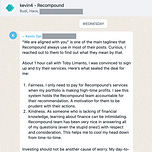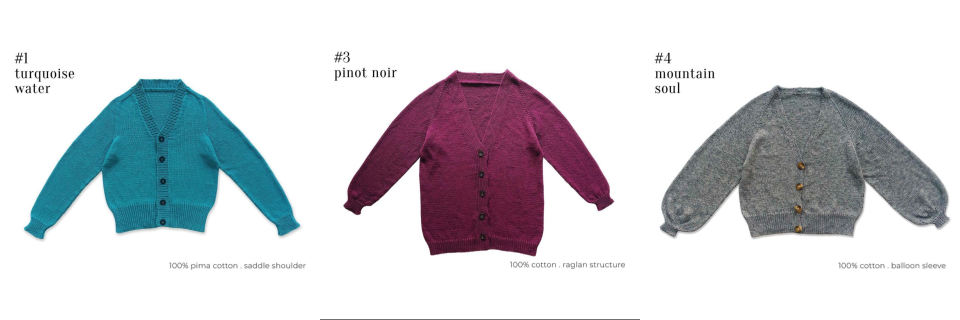Conversation with our true fan: Kevin Tan
This time round, we are doing something different. I invited one of our clients, Kevin Tan, and recorded a podcast with him.
Kevin is one of our early clients. In our early days running Recompound, we mostly got our clients by messaging them one by one through LinkedIn. But Kevin did not become our client because we approached him. Instead, he started off by following our Instagram page, liking lots of our posts, and after a few weeks of silently liking and commenting on our Instagram page, he decided to sign up as our client.
Even in the first few months of becoming our clients, our relationship was purely as a Recompound-and-client relationship. But one thing remains: he likes 90% of our Instagram posts and is the most frequent commenter. We definitely notice this (because Recompound’s Instagram is run by the founding members themselves) and are secretly very happy, so much so that we audaciously name him our number 1 true fan.
So about a month ago, in the spirit of gathering feedback, I reached out to Kevin for a chat. Together with the many conversations that I had with other clients, I noticed one common thread. Many of our long-standing clients are extremely admirable people with admirable values. I always leave a meeting learning so much from each of them (that sometimes I even forgot to talk about Recompound).
Realising this, I decide to try a new thing: start a podcast series where I aim to be the dumbest person in the room and just be a sponge, learning from my conversation partner.
So to start off this series, I feel it is only apt to invite our number 1 true fan: Kevin Tan.
Intermezzo: shameless plug
Before diving in to our conversation, let’s hear from Kevin on what made him decide to try Recompound in the first place.
Question: Given that you did not know any of Recompound’s member personally, why and how did you decide to sign up to Recompound?
Kevin’s kind and thoughtful answer serves many purpose:
It makes our heart melt ❤️
It motivates us to serve our clients better
It gives us a sense of what is the pain points faced by people and how we can address them
What we will be talking about
In our conversation, we talked about a lot of things, shared numerous anecdotes, linked different parts of the conversation together, cracked jokes randomly; our conversation was so unstructured that after the session, I thought I had done a bad job as an aspiring podcaster.
But then I realised that I am not giving a presentation. And real conversations are messy, jumpy, unstructured, fluid, meaningful, stupid and smart all at the same time.
So to achieve a balance of structure and reality, I decided to write an accompanying blog post to our podcast. In this blog post, I will write about our conversation in a structured way (with main points, elaboration, and good flow between sections) and covering only the high levels. But if you are interested to know more about Kevin and the details of the conversation, I highly encourage you to listen to the podcast. Because in it, you might catch details that resonate with and ring differently for you and of course, you will also get to know more about what kind of person Kevin is.
Better yet, you can read this post and listen to the podcast 😀
Main topic 1: How to stay sane, a book by Philippa Perry
When I reached out to Kevin, I know my objective is to learn from him. So instead of talking about Recompound or specifying the discussion topic that I want, I asked him about what he wants to talk about instead. He suggested discussing his favorite book “How to stay sane” by Philippa Perry.
Before diving into the book, I asked Kevin about why do we care reading about this book? Why do we care about “staying sane”?
Staying sane can help you achieve 3 things:
Make you happier
Make others happier
When you and people around you are happier, the world becomes a better place ❤️
I assume we all agree that we do want to be happier, we want others to be happier, and we want to have a better world. So how can we achieve that (according to the book and Kevin’s own interpretation)?
Inculcate self-awareness
This means being able to separate (i) you from (ii) your feelings. When you are overwhelmed by negative feelings, know that these feelings are not you. You can practice some exercise to take a break from these feelings before coming back to them, which will then help you respond better.
Having good relationship with others
This is achieved by open communication, which include appreciation and complaints. Yes, complaints! The thing is, complaints do not have to be negative. In fact, they can spur growth for oneself and strengthen relationship. And the way to achieve this is through constructive language.
Example of bad language: you were so dumb in the meeting just now!
Example of constructive language: I noticed that in that meeting, you were not engaging enough. Perhaps next time you can try to ask more questions, keeping in mind the objective of the project.
Stress
Stress is part of life and can definitely drive you insane. To stay sane, you need to know how to manage stress, one of which is through self-awareness.
Furthermore, stress is actually a really good driver for growth, which in turn gives people a sense of satisfaction in life. When you do something difficult and successfully achieve it, you see yourself grow and feel good about yourself. So learning to purposely expose yourself to stress is a good thing.
Self-narrative
When we face reality, reality is just as it is. But when we start introducing a subject (you), the subject will interpret that reality through a story. For example:
Reality: I get an F in an exam.
Interpretation 1: I am a dumb person.
Interpretation 2: I do not yet understand the material of the subject.
If you adopt interpretation 1, you will feel sucky about yourself. With interpretation 2, you may want to try different methods of learning to understand the material.
Main topic 2: Kevin’s hobby - knitting
To Kevin, passion means something that he likes to do for the sake of it (not because it can help him achieve something else, like being rich, being praised, being cool) so much so that he is willing to go through the difficulties of doing it.
Kevin has a unique passion and hobby: knitting, which he has done for more than 10 years now. It is admirable that one can have the consistency to do something for so long. After all these years, I asked him how knitting has impacted his life:
Learning to enjoy the process itself
The satisfaction when he completes knitting a sweater will probably only last for an hour — so fleeting, and we often crave for what next? But if he focuses on the process itself, he gets hundreds of hours of therapeutic moments seeing his sweater growing row by row.
A self-awareness practice
Remember point 1 on how to stay sane? Knitting is almost like a meditation practice, where his mind stops thinking about work stress and focuses on moving his hands to get the next stitch, the next stitch, the next stitch, the next stich…
Showing love for others
Knitting becomes and opportunity for him to express love for his family and close friends. You don’t actually need lots of money to show that you love someone. Just hundreds of hours is enough 😵
Appreciating handmade crafts and imperfection
Even though a factory-made sweater is perfectly symmetric and has no holes, while his sweater might have slightly longer right sleeve and extra armpit hole (for ventilation XP!!!), that handmade sweater has a lot more meaning.
I can definitely attest to this. After knowing how much effort has to go into getting 1 client, making that client profitable, just to get non-zero invoice, every rupiah is so valuable to me!
In some sense, having this knitting hobby is a way to stay sane for Kevin, as it is a way to quiet his mind (practice self-awareness) and challenge himself by taking up increasingly difficult projects (growth through stress).
Closing remarks: Things are easier said than done
The four ways to stay sane are good, indeed. But things are easy to say, difficult to practice. Kevin suggested that one way to do this is to get help from people around you.
For instance, I myself struggle with waking up early every day. So what I do to get up early on Sundays is to make promise to my friends to meet for car-free-day runs. Because I have committed to this promise, I really have to wake up at 5am on Sundays. And it works!
Or if any of you readers want to help me wake up early, you can schedule a call to learn more about Recompound in the early mornings as well! 😉






